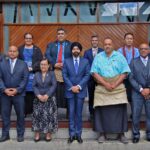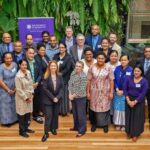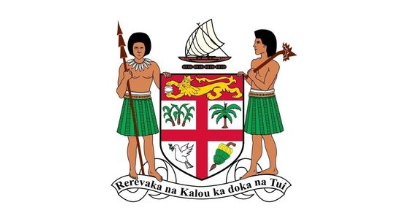
Prime Minister Rabuka attends a high-level meeting with Pacific Leaders and World Bank President
05/09/2024
Fijian Civil Servants benefit through the Australian sponsored training
10/09/2024Published On: 10/09/2024
Salutations
• Honorable Speaker Sir,
• Honorable Ministers and Assistant Ministers,
• Honorable Leader of Opposition,
• Honorable Members of Parliament, and
• Ladies & Gentlemen
Opening Remarks
1.0 Ni sa bula vinaka and a very good morning to you all.
Mr. Speaker Sir, please allow me to acknowledge the Chinese Ambassador who is with us this morning, His Excellency, Zhou Jian.
I also greet those who are watching us on television, livestream or listening on radio.
Background and Context
At the outset, I would like to express my gratitude for the remarkable friendship with the Peoples Republic of China. While our bilateral relationship was formally established 49 years ago, the Chinese have been in Fiji for over 150 years, with much intermarriage as well. I was proud to describe our Ambassador to China, His Excellency Robert Lee to President Xi Jinping, as an ethnically Chinese descendant from Fiji, scion of one of the many Chinese families of Fiji.
Mr. Speaker Sir, the bilateral relationship between the Republic of Fiji and the Peoples’ Republic of China is founded on mutual respect and cooperation while the “One China Policy” has been a key pillar of our bilateral relationship. Mr. Speaker Sir, since assuming office in 2022, my primary goal has been to strengthen relationships with Fiji’s bilateral and multilateral development partners. The ultimate goal is to restore Fiji’s position on the global stage as “friends to all, enemies to none” and fortifying our foreign policy principles of “sovereignty, security and prosperity.”
In this spirit, I have been keen to deepen ties with the Peoples Republic of China and was honored to accept the gracious invitation extended by Premier Li Qiang for the official visit conducted from the twelfth (12th) to twenty-first (21st) of August 2024. Mr. Speaker Sir, the visit marked a significant step in strengthening bilateral relations and exploring new avenues of cooperation to benefit our nations and our peoples.
Fiji – China Relations
Mr. Speaker Sir, the Republic of Fiji recognizes that the People’s Republic of China (PRC) is the sole legal government of China in line with the United Nations resolution on the “One China Principle.” China’s longstanding relationship with Fiji as a true friend who stands firm, particularly when we face difficult periods of isolation from traditional partners.
China’s Development Progress
Mr. Speaker Sir, for my delegation and I, the official visit was both humbling and thought-provoking. The visit gave me the privilege to witness for myself, the remarkable progress achieved in China in just three decades since my previous state visit in 1994. Mr. Speaker Sir, in just thirty years, the China has experienced an unprecedented transformation.
Since 1994, China’s Gross Domestic Product or (GDP) has increased from just over US$560 billion to a remarkable US$18.5 trillion today. This is testament to China’s strategic vision, innovation, and pursuit of economic development. In the same period, China has elevated its GDP per capita from a modest US$470 to around US$13,000. This has translated to a significant improvement in the standard of living of China’s people. This achievement is even more impressive given China’s population, which has grown from approximately 1.2 billion in 1994 to over 1.4 billion today.
China has significantly reduced its poverty rate, lifting hundreds of millions out of poverty — from poverty alleviation to poverty eradication. In comparison Mr. Speaker Sir, while Fiji has also made significant strides in its own economic development, it is on a different scale. Fiji’s GDP has grown from US$1.9 billion in 1994 to approximately US$5.8 billion today. Our GDP per capita has similarly improved, increasing from around US$2,500 in 1994 to over US$6,200 today. These figures reflect steady progress in a country with a population that has grown from just under 750,000 in 1994 to around 980,000 today.
While our progress is notable, a comparison with the People’s Republic of China highlights the significant difference in scale and speed of development between our two countries. This highlights the importance of recognising our unique challenges, and the need to continuously adapt and learn from global success stories.
Mr. Speaker Sir, my delegation and I witnessed once impoverished villages become communities where residents have grown healthier and wealthier through strong leadership and commitment in the implementation of policies. Mr. Speaker Sir, the remarkable development progress of China is largely attributed to a fundamental shift in mindset of its people.
Seeing the great progress made to lift these communities out of poverty, I was reminded of the Chinese Proverb, and I quote “give a man a fish and you feed him for a day. Teach him how to fish and he can feed himself for a lifetime” – unquote.
Mr. Speaker, what we witnessed in China is that the Government provided the necessary enabling environment, while it was the people that truly drove development progress.
Official Visit to China’s Yunnan, Fujian, and Zhejiang (pronounced Jeh-Jang) Provinces
Mr. Speaker Sir, the official visit started with a visit to three remarkable provinces —Yunnan, Fujian, and Zhejiang Provinces.
Our visit to the three Provinces provided valuable insights into China’s ongoing development efforts and facilitated deep and considered analysis of our own development journey. Mr. Speaker Sir, each province showcased unique strengths and innovations that can serve as lessons for our small island nation, particularly in areas such as poverty alleviation and sustainable development.
Yunnan Province
Mr. Speaker Sir, In Yunnan Province, I was deeply moved by the infrastructure development and connectivity that have been established to uplift rural communities. Yunnan Province is the most ethnically diverse province in the Peoples Republic of China with 51 ethnic groups. The achievements made in alleviating and in some cases eradicating poverty is impressive.
It is instructive and commendable that the Government of China has endeavoured to ensure that “no one is left behind.” My delegation and I witnessed this in the minority ethnic villages in Yunnan who have been lifted out of poverty in a steady, focused and tailored program of interventions over the last thirty years.
Our visit to Malipo County in Yunnan was eye-opening, as we witnessed first-hand how modern infrastructure has transformed the once poverty-stricken County – helping to lift its residents out of poverty.
Basic infrastructure such as roads, housing developments and healthcare facilities are not just symbols of progress but also links that connect rural populations to opportunities for a better future.
This experience reinforced my belief in the importance of investing in the revitalisation of rural, interior and maritime zones to ensure a level playing field for economic prosperity for all citizens.
Fujian Province
Mr. Speaker Sir, our visit to Fujian Province showcased the innovative technological advancements that are driving China’s economic growth. State-of-the-art logistics, software and automation systems at the Xiamen Port have made it one of the world’s busiest ports, ranked in the top 20 in the world at 13th place, receiving an average of 45 vessels daily. Given its advanced infrastructure and strategic location, Xiamen port plays a critical role in fostering economic integration across the maritime Silk Road trade route between Asia, Europe, and Africa.
Mr. Speaker Sir, my delegation and I witnessed first-hand how China is committed to reducing its carbon footprint. China’s approach to development demonstrates a balanced focus on people centred development and environmental stewardship.
This is aptly captured in a famous quote from President Xi Jinping, that “clean rivers and clean air are as valuable as gold and silver.”
Mr. Speaker we also visited the Contemporary Amperex Technology Company Limited (CATL).
CATL (pronounced kettle) is a new energy company and leader in the production of lithium batteries. The visit demonstrated how China has invested heavily in renewable energy, expanding its electric vehicle market. China has also introduced carbon trading and reforestation projects, marking a shift towards sustainability.
Mr. Speaker Sir, our visit to a fish breeding site and large-scale sea farms in Ningde highlighted China’s commitment to sustainability in the fisheries sector — one that is vital to both our nations. The population of the large yellow croaker, an endemic commercial fish species declined sharply in the 1960s and 1970s.
To revive this endemic species, the Chinese Government created a spawning ground in Ningde.
According to statistics from Ningde’s local government, the total production of large yellow croakers in Ningde reached 191,000 tonnes, accounting for 80 percent of the country’s total production in 2021. The value of fish from sea farms or mariculture in Ningde alone, reached about US$976 million in the same year.
There is much to learn from China in ensuring long-term viability of marine resources while meeting both domestic and international demand.
Zhejiang Province
Mr. Speaker Sir, the Mawei Shipyard in Zhejiang Province showcased China’s industrial strength and innovation. The Shipyard has capacity to design, build and repair various ships below 35,000 tons.
Mr. Speaker Sir, our visit to the eco-friendly Waste Management Facility in Hangzhou [Pronounced “Hang-Joe”] demonstrated how sustainability can be integrated into urban planning. This is a lesson to draw upon in considering Fiji’s waste management and pollution challenges. Mr. Speaker Sir, our visit to the Yiwu International Trade Market and Yiwu Industrial and Commercial College highlighted the potential for entrepreneurs to learn how to participate successfully in e-commerce.
Finally Mr. Speaker Sir, we were treated to a cultural extravaganza at West Lake highlighted China’s appreciation of its cultural heritage.
HIGH LEVEL MEETINGS
Mr. Speaker Sir, our visit to the three Provinces informed bilateral meetings in Beijing with:
• the President Xi Jinping,
• the Premier – Li Qiang, and
• the Chairman of the National People’s Congress/Speaker – Zhao Leji.
Sir, I am pleased to convey the Chairman Zhao Leji’s warm regards and an invitation to you to visit the National People’s Congress of the People’s Republic of China, at a time of your convenience.
In our bilateral discussion, we reaffirmed the importance of development cooperation, laying the groundwork for a new blueprint in our partnership.
We agreed to strengthen dialogue at all levels, with Fiji reiterating its commitment to the One China Principle.
China, in turn, expressed readiness to enhance communication, cooperation, and coordination with Fiji under the framework of South-South Cooperation.
The President, His Excellency, Xi Jinping emphasized his commitment to balanced development, stating that “clear waters and green mountains are as valuable as gold and silver.”
Mr. Speaker Sir, China’s modernisation efforts offer valuable lessons for Fiji.
I am also pleased to report that China has committed to supporting Fiji’s development including a US$4 million cash grant as an initial measure of assistance for poverty alleviation programme/ rural revitalisation schemes. Furthermore, we jointly agreed to introduce pilot poverty alleviation projects in Fiji, to improve the lives of our people.
We also reaffirmed our mutual commitment to multilateralism, especially in tackling climate change, and agreed to actively pursue the Global Development Initiative.
China also endorsed the “Ocean of Peace” concept, which closely aligns with President Xi Jinping’s five principles for Peaceful Co-existence.
These discussions strengthened Fiji’s relationship with China and opened new avenues for cooperation.
Memoranda of Understanding
Mr. Speaker Sir, we signed a series of Memoranda of Understanding (MOUs) on the margins of the meeting with the Premier.
These include an MOU on the upgrading of the 82 kilometer Vanua Levu Road Project, which will enhance connectivity and economic opportunities.
Additionally, an MOU on Trade and Development was signed to foster greater economic cooperation, creating new avenues for trade and investment.
The establishment of a Working Committee on the Blue Economy is another pivotal agreement. The Committee will focus on sustainable ocean management ensuring both countries benefit from a shared approach to preserving and utilizing our marine resources.
These agreements are testament to our growing partnership which promise tangible benefits for the people of Fiji through improved infrastructure, economic growth, and sustainable practices.
Fiji Diaspora in China
Mr. Speaker Sir, I also had the opportunity to meet with members of the Fijian diaspora, and a group of 30 of our students pursuing tertiary education in China on scholarship.
The scholarships foster strong bonds between our peoples and ensure that our cooperation extends to the long-term development of Fiji through the empowerment of future leaders.
I thank you, Mr. Speaker.
Vina’a Va’alevu.



